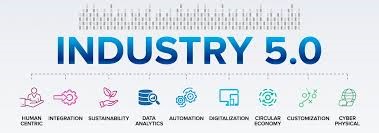Preparing Learners for Industry 5.0: The Rise of Education 5.0

Industry 5.0 is a new industrial revolution that will change labor, education, and society by combining human creativity with technology. Industry 5.0 places more of an emphasis on customization, human-centered design, and cooperation between humans and machines than Industry 4.0, which was more concerned with automation, robots, and artificial intelligence. This shift necessitates a similar evolution in education, which educators refer to as Education 5.0, so that the current generation is prepared to adapt. At Presidency University, and especially within the Presidency School of Management, this alignment of Industry 5.0 and Education 5.0 is central to preparing students with the right mix of skills for the future.
#industry5.0 #skillbasededucation #sustainability #eraofAI #futureskills
Evolution of Education
Education has also gone through many stages. While Education 1.0 was a teacher-centered, traditional classroom teaching style where students were passive users of information, Education 2.0 started integrating technology and facilitating more teacher-student engagement and cooperation, it was still frequently inside traditional frameworks. Education 3.0 was a student-centered, active learning method that included community engagement, technological integration for individualized and autonomous learning, student ownership, and teachers serving as facilitators. The demands of Industry 4.0, which placed a strong emphasis on innovation and digital skills, drove Education 4.0, which was defined by pervasive technology, co-creation, innovation, and individualized, global learning. Personalized learning is the focus of Education 5.0, which is developed by utilizing AI to provide adaptive, customized learning experiences that meet the needs of students and ethical considerations. It emphasises that every student has unique strengths, and future education must adapt to those differences, ensuring tailored experiences that go beyond “one-size-fits-all.” At Presidency University, this evolution is reflected in academic practices where every student’s strengths are recognized, and the “one-size-fits-all” approach is replaced with tailored, future-ready learning.
Skills for the Future
In the Industry 5.0 era, future professionals need a combination of technical and human-centered skills. Reports by organizations such as the OECD, British Council, and UNESCO highlight critical abilities like:
|
Technical skills |
Soft Skills |
|
Data Analytics and AI |
Creativity and innovation |
|
Robotics and Human-Robot Interaction |
Problem-solving and critical thinking |
|
Cyber physical systems |
Emotional Intelligence and Empathy |
|
Industry IoT |
Collaboration and communication |
Countries like the UAE and the USA have already started initiatives such as Emirates Skills and SkillsUSA, where students compete in areas like engineering, IT, logistics, and design—showcasing the importance of applied, real-world skills.
Personalized Learning as the Core of Education 5.0
The core of Education 5.0 is personalization, and student-led learning is taking precedence over project-based learning, inflexible classrooms, and adaptive learning tools. AI-powered platforms, for instance, can be used to tailor arithmetic lessons for a student who struggles with the subject and direct a creative student toward design tasks. This adaptability guarantees that education has purpose and equips students to be lifelong learners.
Personalized learning, according to UNESCO, is about giving students the tools they need to take charge of their education, not simply about technology. Students are encouraged to relate what they learn in the classroom to real-world applications and mistakes are viewed as opportunities for growth.
Conclusion
Industry 5.0 is about combining digital intelligence and human creativity, not simply about technology. Students will be prepared for this future by Education 5.0, which uses individualized, skill-based, and human-centered methods. Education 5.0 guarantees that the future generation is not only prepared for the workforce but also for creating a more inventive and inclusive world by focusing on lifelong learning and aligning with sustainability goals.
References
Huk, T. (2021). From Education 1.0 to Education 4.0 – Challenges for the contemporary school. The New Educational Review, 66(4), 36–46. https://doi.org/10.15804/tner.21.66.4.03
Bakkar, M., & Al-Osta, M. (2023). Education 5.0 serves future skills for the Industry 5.0 era. In Handbook of research on future policies and strategies for nation branding (pp. 135–153). IGI Global. https://doi.org/10.4018/978-1-7998-8805-5.ch007
Suganya, G., Selvakumar, J. J., Varadharajan, P., & Pachiyappan, S. (2024). Skill sets required to meet a human-centered Industry 5.0: A systematic literature review and bibliometric analysis. In Infrastructure Possibilities and Human-Centered Approaches With Industry 5.0 (pp. 231–252). IGI Global. https://doi.org/10.4018/979-8-3693-0782-3.ch014
UNESCO International Bureau of Education. (2020). Personalized learning within teacher education: A framework and guidelines (Current and critical issues in curriculum, learning and assessment No. 37) [Programme and meeting document]. UNESCO International Bureau of Education. https://unesdoc.unesco.org/ark:/48223/pf0000373629
Written by,
Dr. Prachi Beriwala
Associate Professor, Presidency School of Management













 Rajanukunte, Yelahanka, Bengaluru, Karnataka, Pin: 560119, India
Rajanukunte, Yelahanka, Bengaluru, Karnataka, Pin: 560119, India
 +91 9022092222
+91 9022092222